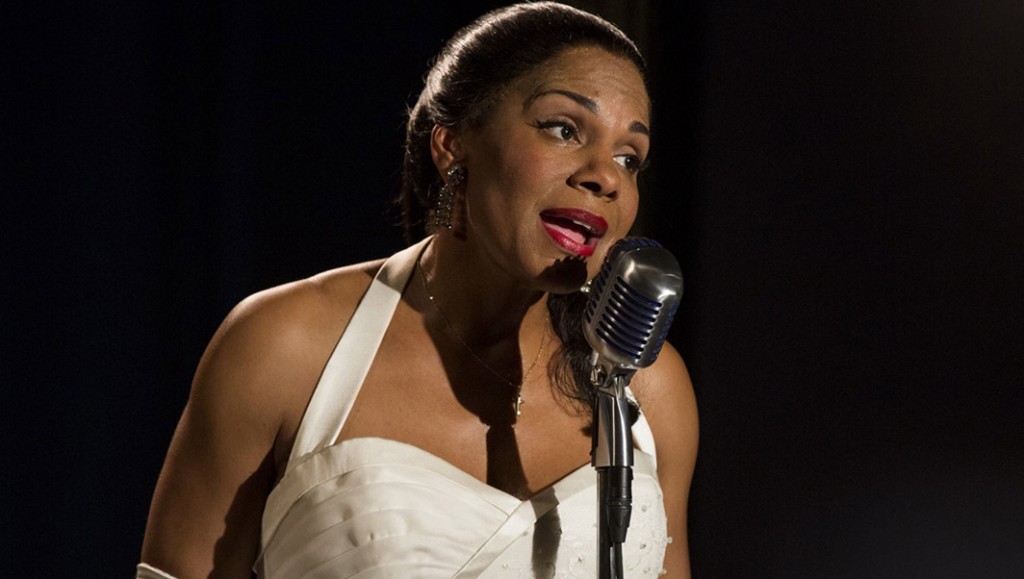To See or Not to See: Audra McDonald as Billie Holiday

HBO has given a gift to theater fans everywhere: it recorded Audra McDonald‘s legendary performance as Billie Holiday in Lady Day at Emerson’s Bar and Grill. The play debuted on Broadway in 2014 and garnered Audra McDonald her sixth Tony Award, thus securing her spot in the Halls of Broadway Ivy. (Basically, she’s officially the Meryl Streep of Broadway.) Filmed in front of a live audience in New Orleans, the special aired on HBO this past Saturday and can now be viewed on HBO on Demond. I urge you to take 90 minutes out of your week to watch it.
https://www.youtube.com/watch?v=ogfzh-Rohu0
The play is a dramatization of one of Holiday’s last shows before her untimely death in July 1959 at the age of 44. She performs in Philadelphia at Emerson’s Bar and Grill, a smoky, intimate jazz club. As Holiday recalls moments from her life in the disjointed autobiography that she shares with the audience, she reveals the scars of her past: a prison in West Virginia. A childhood job in a brothel. Heartbreak. Loss. Drugs. Alcohol. Abuse. Her pain does not only come from her personal journey; it also comes from her status as a black woman in a segregated society. Billie Holiday’s difficult life was thus made even more difficult by an America that saw the color of her skin as clearly as it heard the soul in her voice. We get the sense that all of these experiences made her who she is, and you can hear the pain and defiance in every note she sings. Throughout the show, Holiday soaks herself in booze and becomes increasingly intoxicated. As she slurs and stutters, sloshes her drink and stumbles on stage, we wonder at what point her alcoholic self-medication becomes its own damning demon of addiction.
“Singing is a feeling,” she purrs to the audience. “I’m not able to sing these songs unless I feel a certain way.” So she abruptly starts and stops songs as she attempts to match her inner emotions with music that, to her, is the vulnerable public face of her joy and misery. The depth to which she feels songs changes as she downs more drinks. As you can imagine, this erratic behavior sends her accompanist scrambling to manage her, and his efforts to keep her singing when she no longer want to feels like a perverse exploitation of a suffering artist.
McDonald’s performance is nothing short of brilliant. It is a masterful, aching study of the unraveling of a performer. Though the play itself does Holiday no favors by slicing open the corpse of her tragic life, it is astonishing to watch Audra McDonald transform into the doomed Holiday. Much has been made of McDonald’s ability to imitate, like a lyrebird, Holiday’s one-of-a-kind pinched and pained voice. But it’s also worth highlighting McDonald’s physical performance. Her entire form– hunched, halting, and unbalanced– highlights a battered, wounded body that has battled demons internally and externally. Her heavy, beleaguered movements are from emotional and physical war wounds that have never healed.
The highlight of the performance is McDonald’s haunting rendition of “Strange Fruit,” Holiday’s protest song about lynchings in America. As McDonald wails the lyrics, we see the depths to which she feels her character’s fury and ache– where does McDonald end and Holiday begin? They have morphed into one, and McDonald feels Holiday, just as Holiday always felt the music. Tears seep out of McDonald, just as humanity, pain, and feeling seeped out of Billie Holiday with every note she sang.
McDonald’s shattering performance gives voice to Billie Holiday once again. That beautiful, broken, and soulful voice is all we have left of a great American artist. It is not enough, and could never be enough. But, somehow, it is everything.
Photo Credit: Michele K. Short/HBO


[…] that end, her turns in Ragtime, The Gershwins’ Porgy & Bess, Lady Day at Emerson’s Bar and Grill, and Shuffle Along are exquisite, painful meditations on the lived history of race in an America […]